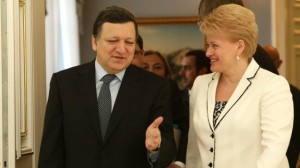
European Commission President José Manuel Barroso met with Lithuanian President Dalia Grybauskaitė later on Wednesday. Photo by Džojos Barysaitės/President's Office
VILNIUS — To increase the ease of business in the Baltic Sea region and the three Baltic states, the bottlenecks in transport and energy need to be solved, European Commission President José Manuel Barroso said on Wednesday morning.
Barroso along with politicians from all around the Baltic Sea region gathered in Vilnius Wednesday morning to talk to business leaders at the Baltic Development Forum. The Baltic states in particular are deemed to have poor transport networks with one of the region’s biggest trading partners, Russia. Often trucks and cars have to wait for long periods of time to cross the border. The train system in the region is also disjointed and underdeveloped.
Barroso said that transport was one way that the Baltic region could revitalize itself.
There are “transport bottle necks that stop transport. Road, rail and sea must be used more efficiently and must use better harbors,” Barroso said during a panel discussion, adding that sea transport in particular needed to be cleaned up for a sustainable future.
In between a string of jokes, a jovial Lithuanian Prime Minister Andrius Kubilius also commented on the energy and transport bottlenecks plaguing the Baltic region during his speech at the conference. He said he sees the energy market of the Baltic Sea region relying on primarily nuclear then renewable energy sources.
Deputy Prime Minister of Sweden Maud Olofsson said that the Nordic countries would work in concert with the other countries in the region to create a workable system.
“We need a new transport system – it has to be very modern and efficient and it has foresee that the business sector and passengers can use this network in a more efficient way. If we want an efficient transport system, we need to work together,” Olofsson said.
This article is free to view. To read Baltic Reports’ subscription-only articles, click here.












